Question
True / False Questions 1)Section 163(j) limits a corporation's ability to pay deductible interest to shareholders and other related persons residing in countries that do
True / False Questions
1)Section 163(j) limits a corporation's ability to pay deductible interest to shareholders and other related persons residing in countries that do not have income tax treaties with the United States.
2)A corporation is subject to Section 163(j) if it has excess interest and its debt to equity ratio exceeds 1 to 1 at some time during the taxable year.
3)The "dividend equivalent amount" under Section 884 is (1) earnings and profits, to the extent deriving form effectively connected taxable income, plus (2) any increase in U.S. net equity for the year, less (3) any decrease in U.S. net equity for the year (but only to the extent of untaxed effectively connected earnings and profits for prior years).
4)The objective of Section 884 is to make the tax result the same as if a foreign corporation conducted its U.S. business through a separate domestic corporation and the domestic corporation distributed all profits, except those invested in the U.S. business.
5)If the election under Section 871(d) is made, all income from real property located in the United States and held for the production of income is treated as income that is effectively connected with a U.S. trade or business.
6)Stock of a domestic corporation is a U.S. real property interest unless the taxpayer shows that the corporation was not a U.S. real property holding corporation at any time during the shorter of (1) the period the taxpayer held the stock, or (2) the five years preceding the disposition of the stock.
Short Answer Problems
7)Real Property Income of Foreign Persons
T, a nonresident alien, is a shareholder of X Corp., whose assets consist of a retailing business in Canada and stock of Y Corp.Y's principal asset is an office building in Miami, but it also holds a portfolio of stocks and bonds of Canadian corporations.How might 897 apply to gain recognized by T on a sale of her X Stock if, alternately:
a)X holds 40 percent of Y's stock, and alternatively:
i)X and Y are both domestic corporations?
ii)X is a domestic corporation, and Y is a foreign corporation?
iii)X is a foreign corporation, and Y is a domestic corporation?
b)X holds 60 percent of Y's stock, and alternatively:
i)X and Y are both domestic corporations?
ii)X is a domestic corporation, and Y is a foreign corporation?
iii)X is a foreign corporation, and Y is a domestic corporation?
8)Branch Taxes
FC, a corporation that is owned by nonresident alien investors and is organized in foreign country X, is sole shareholder of DC, a Delaware corporation that manufactures and sells automobiles in the United States.DC has borrowed money from FC.What U.S. tax burdens fall on funds generated in DC's business that are used to:
a)Pay dividends of $20 to FC?
b)Pay interest of $20 to FC?
Assume that X has no income tax treaty with the United States, that DC's excess interest expense if $5 and that that DC's debt to equity ratio is 2.33 to 1.
Step by Step Solution
There are 3 Steps involved in it
Step: 1

Get Instant Access to Expert-Tailored Solutions
See step-by-step solutions with expert insights and AI powered tools for academic success
Step: 2

Step: 3

Ace Your Homework with AI
Get the answers you need in no time with our AI-driven, step-by-step assistance
Get Started


